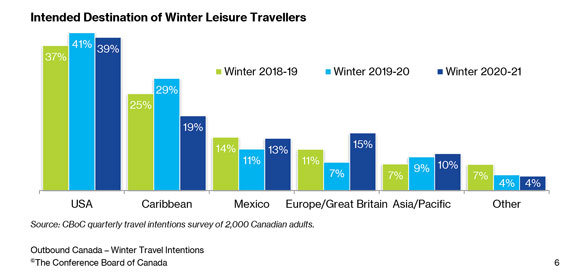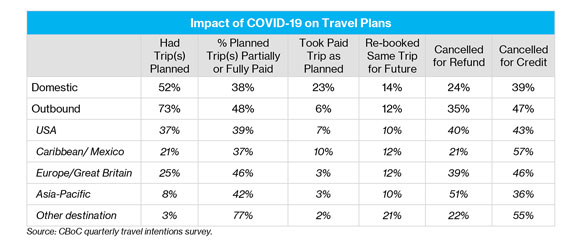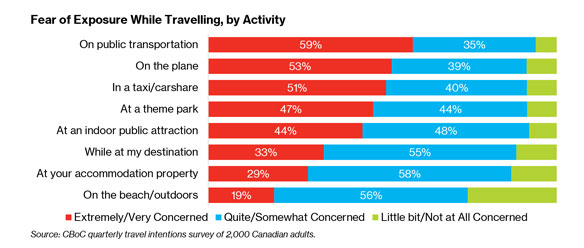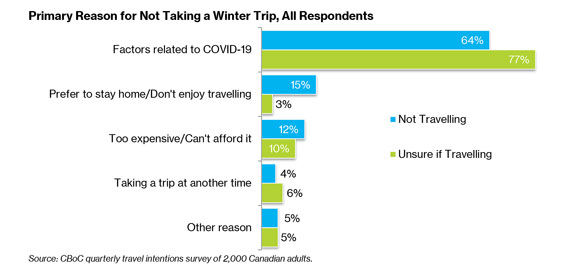
COVID-19 and Canadian travel intentions
Outbound Canada releases Winter 2020-2021 Outlook

Outbound Canada
In its Winter Travel Intentions Outlook for the Winter of 2020-2021, Outbound Canada reports that:
“As would be expected, the COVID-19 crisis continues to have a substantial impact on the travel activity of Canadians. The most recent travel intentions survey indicates that just 36% of adults plan to take a leisure trip between November 2020 and April 2021, a significantly smaller share than last year (64%).
And it continues that:
“Compared to last year, the proportion of respondents who are currently planning any leisure travel has decreased most dramatically in British Columbia (down 34%) and Ontario (down 32%).”Outbound Canada points out that:
“Not surprisingly, of travellers who have selected their destination, a much larger proportion than reported in previous years intend to spend their longest winter vacation within Canada. In fact, the share has effectively doubled compared to winter 2019-20. On the other hand, just 3-in-10 respondents planning a trip in the coming months intend to leave the country, compared to almost two-thirds last year.”

What’s the impact?
In terms of the impact of COVID-19 on the travel plans of Canadian, the Outlook indicates that:
“More than six-in-ten respondents (64%) indicated that, before the onset of the pandemic, they were planning one or more overnight trips in 2020. Of those travellers, half intended to travel within Canada (52%) and almost three-quarters (73%) indicated they had international trip plans.”
It notes that:
“Of those who intended to travel outside of Canada, 48% indicated that they had paid for some or all of their trip(s) when the travel restrictions were implemented. While some of this prepaid activity did occur, the vast majority of outbound trips were cancelled for credit (47%) or refund (35%) or re-booked (12%). Some transfer of demand was reported as 10% of respondents who cancelled their international trip travelled domestically instead. However, with 88% of respondents with cancelled trips not reporting any other travel, there is a lot of pent-up demand in the market. In fact, 87% of Canadians say they miss travelling.

What’s stopping them?
Outbound Canada’s Winter 2020-2021 also looks at the barriers to travel, indicating that:
“While outbound travel intentions have declined due to factors related to COVID-19, domestic plans have increased from absorbing some of this demand. There is also a higher degree of uncertainty in the market as 16% of Canadians are currently unsure whether they will take an overnight leisure trip this winter. Of these respondents, 77% specifically cited COVID-19 as the primary reason for their uncertainty. Moreover, 64% of respondents who outright said they would not be taking a winter trip pointed to the virus as the key driver of their decision.”
In fact, the Outlook stated that:
“Most respondents without any specific winter travel plans who identified a virus-related reason pointed to health concerns and fear of exposure while travelling as the primary barriers. This sentiment was consistent with both those who are unsure if they will travel this winter and those who are definitely not taking a trip. Respondents who are on the fence about their plans are more likely to identify the border closure and the mandatory quarantine requirement as barriers to travel.”
And it notes that:
“On the whole, concerns related to the virus are relatively consistent across age cohorts, though older Canadians are less likely to report any intended travel compared to their younger counterparts and are more likely to point to COVID as the reason they aren’t planning a trip (44%).”
VFR a big motivator
However, Outbound Canada reports that:
“Amidst the health concerns prompted by COVID-19, visiting friends and relatives (VFR) continues to motivate a larger share of travel planning than in previous years. While vacation/pleasure trips still account for the biggest proportion of intended travel (56%), the primary purpose of 39% of planned trips is VFR (compared to 29% last winter).”
And it continues:
“This trend is even more pronounced with outbound travellers. Last year, 18% of intended winter trips were to visit with friends/relatives. This share is currently 48%. Furthermore, when asked why they chose their winter vacation destination, spending time with friends and family was one of the top reasons identified by both domestic (47%) and outbound (30%) travellers. Other key motivators for domestic travellers included a desire to stay close to home (45%) and the fact that they feel safe at their destination (35%). In contrast, outbound travellers were most likely to report favourable weather as a primary motivation for their travel plans (44%), as well as a perceived feeling of safety at their chosen destination (28%).”
Vaccinate before travel
As for where vaccinations, quarantine protocols and travel insurance fit in the mix, Outbound Canada’s Outlook indicates that:
“While 87% of Canadians say they miss travelling, the vast majority say they won’t take a trip outside their usual environment until a COVID-19 vaccination is widely available. This sentiment is more pronounced with international activity. Three-quarters of travellers report that they won’t take a trip outside of Canada until a vaccine is available and a little more than half (53%) feel the same way about domestic travel.”
And it continues:
“Even so, one-quarter of respondents say they do not plan to get vaccinated. In addition to the correlation between vaccinations and travel sentiment, Canadians also say the availability of COVID-specific insurance coverage increases their willingness to travel. More than half of travellers (52%) reported that the inclusion of COVID-specific health insurance coverage by airlines, tour operators, and other suppliers increases their willingness to travel right now.”
Outbound Canada also reports that:
“A change in quarantine requirements would also prompt an increased willingness to take a trip, but only for a small portion of the market. When asked, hypothetically, if time and money were not an issue whether they would travel internationally right now if the mandatory quarantine period was eased, just 18% responded positively. But, if rapid testing was used instead of quarantine protocols, the share willing to take a trip increased to one-quarter.”
Making adjustments
Writing that “given the link between air access and Canadian outbound travel,” Outbound Canada said that:
“The airline industry has an important role to play in getting travellers back in the air when the time is right. When asked which three safety practices would make them feel most confident about their health while flying, 66% want mandatory face masks used by all staff and passengers in flight and 57% want carriers to reduce passenger capacity. Other practices rounding out the top choices include thermal screening of passengers and personnel before boarding (39%) and the use of high efficiency HEPA filtration systems on-board the aircraft (29%).
Check before travelling
The Outlook also reports that:
“In addition to adjusting air travel behaviours, 91% of travellers say they will check infection rates at a destination before booking in the future. The share of travellers who say they are extremely/very concerned about contracting COVID has dipped a little over the past few months (34% vs. 37%), but ongoing communication regarding virus management and health protocols will be important to reassure and attract visitors.”
Outbound Canada observes that: “Travellers continue to be most concerned with the possibility of virus exposure during transit, including on public transportation (59%), on an airplane (53%), or in a taxi (51%). On the other hand, travellers are less concerned when they have more control over their surroundings, including on the beach/outdoors (19%) at accommodation properties (29%), and while exploring a destination (33%).”
Still Concerned About Exposure
The Winter 2020-2021 Outlook found that:
“Canadians remain concerned with potentially being exposed to the virus while travelling, even within their home province. On a seven-point scale, where 1 represents “not at all concerned” and 7 represents “extremely concerned,” travellers reported the highest average score for the US (6.08), Asia (5.64), and Europe (5.64).”
And it continued:
“While the top two regions of concern have not changed over the past few months, Canadians are a little less worried about specific areas, identifying a similar perception of potential exposure for all destinations outside of Canada. This is also true of top-box scores. While the US remains the region of most concern, traveller apprehension is declining. A few months ago, 83% said they were extremely/very concerned about being exposed to COVID while travelling to/within the US This share has dropped to 69%.”
Yet even so, Outbound Canada’s Outlook reports:
“Just 12% of Canadians think the coronavirus situation in the US will improve in the short-term and eight-in-ten Canadians disagree that the border should re-open as soon as possible. Moreover, when asked, hypothetically, if the border were open and flights were available and time and money were not an issue, whether they would travel to the US right now, 59% responded, “absolutely not” and another 21% said, “probably not.”

Planning with an agent
As for what the outlook is for travel agents in the winter of 2020-2021, Outbound Canada found that:
“Around eight-in-ten respondents who are planning an outbound trip intend to use the internet to research their destination (79%), compare prices (82%), and/or book transportation (81%). In addition, 63% plan to book their accommodations online and almost half (46%) intend to book a vacation package online. While a good proportion of Canadians planning an outbound, winter trip intend to use the services of a travel agent (including OTAs) for information and/or to book, the share is smaller than last winter.”
And it added in its Outlook that:
“Overall, half of outbound travellers currently plan to use a traditional or online agency for information, compared to almost two-thirds last winter. Also, a little more than one-third intend to book at least some portion of their trip through an agent, versus 55% one year ago.

Packages, timing and more
Outbound Canada also reports that:
“Less than half (46%) of Canadians planning an outbound trip this winter are very/somewhat likely to purchase a package vacation, which includes at least their transportation and accommodations. This compares to 54% last winter.”

And it points out that:
“Canadians planning to visit the Caribbean or Mexico continue to be the most likely to purchase a package (69%), whereas those planning to visit the US are least likely to buy travel in this manner (31%). About half of those destined for the AsiaPacific region (48%) and 35% of those planning to travel to Europe say they are likely to include a package in their travel plans.”
The Outlook found that:
“Overall, middle-aged travellers (aged 35-44) report a higher likelihood of purchasing a package compared to other age cohorts, but this age group is also most likely to be planning a trip to Mexico or the Caribbean. Just 7% of winter travellers have already booked their transportation, accommodation, or vacation package, a much smaller share than reported last year at this time (20%). Furthermore, almost six-in-ten intend to book their trip eight weeks or less prior to departure, compared to half last winter (49%).”
In this respect, Outbound Canada notes that:
“This correlates to the high degree of uncertainty in the market as travellers continue to hope that they can get away despite the current restrictions and closures. Almost three-quarters of travellers planning to book less than eight weeks before departure are destined for the Caribbean/Mexico (35%), or the US (37%).”
Outlook for the Season
As for the seasonal outlook, Outbound Canada states that:
“With the temporary suspension of air travel between many countries and significant schedule reductions on other routes, outbound service on Canadian carriers throughout the winter season is currently reported to decline by 5.3 million direct seats compared to last winter.”
It continues:
“Carriers are reporting the largest change with service to the US and sun destinations, especially for the first portion of the season. The increases presented for the final two months of the season are solely due to the grounding of the vast majority of flights in April 2020 — the current planned capacity for March and April 2021 is 28% less than the volume of seats offered in 2019 (the most recent “normal” year).”
And Outbound Canada’s Winter 2020-2021 concludes:
“With very little trans-border activity anticipated until vaccinations are widely available, travel to the US is projected to fall by 6.5 million trips (down 91%) this winter. Similarly, diminished capacity, ever-changing travel policies and varying quarantine requirements are projected to reduce overseas trips by 5.1 million (down 88%).
